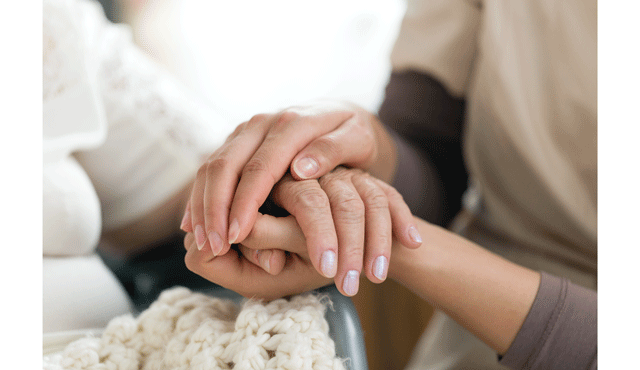With many catholic families finding themselves sandwiched between caring for growing children and aging relatives, ministries to caregivers are top priorities for the Diocese of Orange and its parishes.
“What I’ve found is that caregivers are so busy with caretaking that they fall off the radar,” says Jennifer Dagarag, R.N., community nurse for St. Irenaeus Church in Cypress. “Their biggest fears are of abandonment and being overlooked. They don’t want to be a burden, but they don’t want to be forgotten about, either.”
Dagarag works with her parish’s hospitality teams to identify elderly couples, families whose members have disabilities, and adults with special needs to maintain relationships with them and provide them with resources.
“When one of a couple is missing, we need to check on them. Is there a medical issue at home?” she says. “When we can meet their needs for delivering food or help when they feel overwhelmed, we are caring for their spiritual needs.”
Linda Ji, the diocese’s director of pastoral services for families in all stages, notes that several Orange County parishes have nurses like Dagarag on staff to provide outreach to those in need and promote wellness among individuals and families.
“There is more we can do as a Church to make intergenerational connections,” Ji observes. “The most active members of most parishes are older people. I think that makes it important to provide interactions between generations, and to offer the opportunity for faith to be shared.”
Dagarag notes that parishes like St. Irenaeus are reaching out to caregivers to provide much-needed support. “Caregivers need a lot of support, and that must be recognized,” she says. “We all need to support them, and to have conversations with them about how difficult it is. We must recognize when our brothers and sisters are in need – and that identification comes from awareness.”
The Diocese of Orange is part of the statewide Whole Person Initiative, a collaborative effort between the California bishops and Catholic health care systems that began in 2015 as Catholics fought California’s physician-assisted suicide law. Joseph Dao, regional program manager for the initiative, says it is training parishioners to be a support for those who are seriously ill, as well as providing resources for palliative care and hospice.
Dao estimates that 46 percent of the caregiving provided statewide is by unpaid caregivers, equaling about $470 million in unpaid care. “We talk about the crisis in caregiving,” he said, “and we offer a map of caregivers’ resources, tips on self-care for caregivers, and ideas on how to communicate with caregivers who are having a hard time.”
Given the global coronavirus pandemic, caregivers are even more stressed – and more people are finding themselves in the roles of caregivers.
“One thing the pandemic has brought to light is that we can’t expect everyone to come to our parish doors,” Ji notes. “We need to go out more. If we want to reach people in need, we must meet them where they’re at.
“We can provide space and support for them at church, but we need to go out and find the people who need support,” she adds. “That’s what Christ did. He knew that healing needs to come first – then people are prepared to hear the gospel.”

